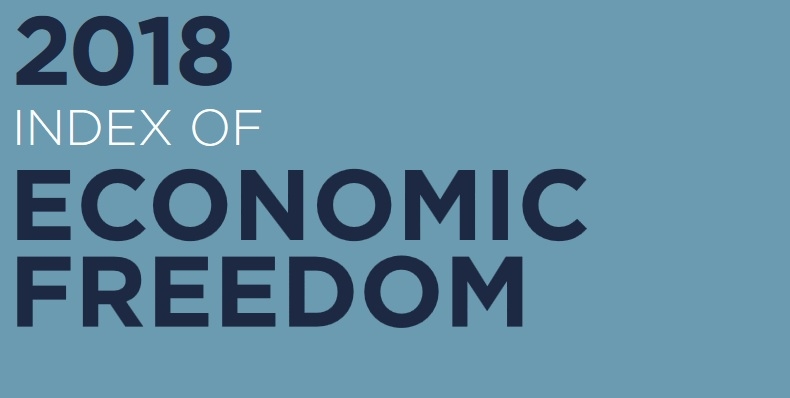The 2018 Index of Economic Freedom shows Croatia’s clear priorities. Lowering tax and spending burden, removing disproportionate business and labor regulations, as well as reducing corruption, remain key areas for structural reforms. While progress in trade freedom is a result of the EU accession, moderate trends in fiscal consolidation, tax and red-tape cuts have opened a mid-term path to reach (at least) TOP 50.
U.S. think tank Heritage Foundation brings a new ranking where TOP 10 countries are Hong Kong (90%), Singapore, New Zealand, Switzerland, Australia, Ireland, Estonia, United Kingdom, Canada, and United Arab Emirates.
The 2018 Index of Economic Freedom ranks Croatia as 92nd. This is 3 positions and 1.6%-points advance compared with the 2017 data. With 61% of economic freedom Croatia is 39th out of 44 European countries.
 Source: Heritage Foundation, 2018
Source: Heritage Foundation, 2018
If we compare Croatia with European countries with lower overall economic freedom scores we can see that all of them have higher business freedom and almost all have higher fiscal health, tax, and labor freedom. Croatia is the best in trade freedom which is a part of EU accession, as well as in investment and financial freedom.
Heritage Foundation’s report for Croatia emphasizes fiscal consolidation and improved business climate:
“Its overall score has increased by 1.6 points, with a spike in the fiscal health score and improvements in government spending and business freedom… Although Croatia lags behind many of its neighb[o]rs in structural economic reform, the government has acted to improve the business climate by simplifying the tax code to stimulate growth from domestic consumption and foreign investment. Significant remaining challenges include political volatility and a level of public-sector debt that makes government spending on health care and pensions fiscally unsustainable. Pervasive corruption undermines the rule of law, and protection of property rights is weak”.
Indeed, Heritage Foundation rightly points out a long-term challenge of public debt, which is connected with fiscally unsustainable pension and health care spending. Spending cuts in these areas are the only path to reduce high labor taxation. Overall pension and health insurance contributions create 35% labor burden (additional to 36% top marginal personal income tax rate).
When it comes to key policy areas Croatia has improved its score in property rights, business freedom, government spending and fiscal health. Trade and financial freedom remain at the same level, while labor freedom represents a critical structural issue.
 Source: Heritage Foundation, 2018
Source: Heritage Foundation, 2018
However, certain data could be updated in the 2019 report (if not in 2018).
-
If public spending’s ratio in GDP is 47% (which is the same result as in previous years), what is a reason for the increased score in public spending?
-
Tax burden data should be updated. Due to moderate tax cuts top personal income tax is now 36% (instead of 40%), while top corporate income tax is 18% (instead of 20%).
-
Deficit’s ratio in GDP was around 0,5% (instead of 3,4%), which therefore proves the mentioned fiscal consolidation and fiscal health improvement.
-
Public debt’s ratio in GDP is getting closer to 80% (instead of 84%).
-
Regulatory efficiency’s score has increased due to improvements in business freedom. The 2019 and 2020 reports could bring additional increases due to the progress in regulatory reform focused on red-tape cuts, making starting business easier and enabling services market liberalization. Labor freedom is 43% and reflects rigidities in labor regulation (which has gone through only minor changes so far).
-
Trade freedom remains at the same level. It has been increased due to the EU accession and liberalization effects related to the Internal Market.
-
Rule of law remains a challenge due to a flawed court system and widespread corruption. Property rights improvements are related to good legal framework and sensible enforcement.
Concluding Remarks
Croatia is currently 61% economically free. There is no country with more than 90%. Therefore, Croatia’s competitive gap is much more than the 39% deficit in economic freedom. Croatia’s challenge is to compete with much better countries of Central Eastern Europe. Currently, Estonia holds the 7th place and Lithuania 19th. But why shouldn’t Croatia try to compete with the Czech Republic (ranked as 24th) or Latvia (28th)? A gradual and realistic approach would mean entering TOP 50 first. This means that the first check points would be (currently) 45th Poland. 47 ranking place of Croatia distances the country from Poland only by 6 percentage points. Actually, Croatia’s current score may be a little bit higher due to the abovementioned updates.
If Poland is the first check point, Latvia could be the second one. This is a matter of free market reforms which can bring more economic freedom and sustainable prosperity. Lowering tax and spending burden, removing disproportionate business and labor regulations, as well as reducing corruption, remain key areas for structural reforms. Learning good comparative experiences from countries of Central and Eastern Europe is therefore a way forward.



